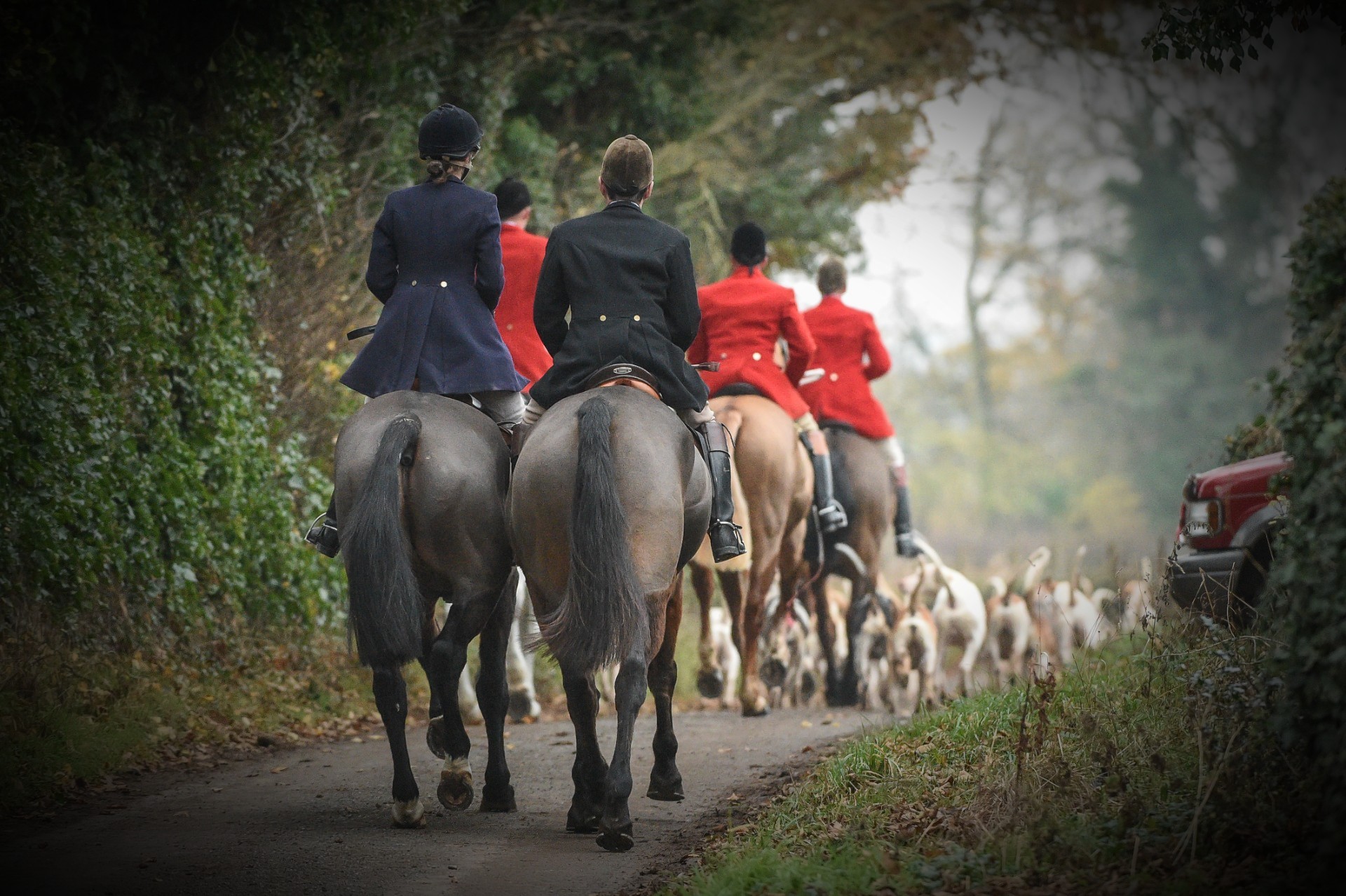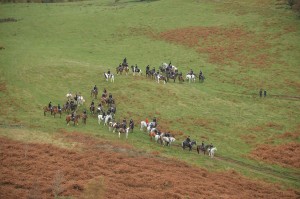 The main concern most newcomers face when wishing to come hunting for the first time seems to be the fear of wearing or doing the wrong thing. Whilst we hope you find us both helpful and tolerant during your first days, etiquette remains an important part of the days hunting, not only to ensure an acceptable public image, but for safety, consideration for the land we are crossing and to ensure that the hounds and huntsman are unimpeded during the days activities. We hope this guide will help you to feel more confident about joining us and the more you hunt with us the more you will understand the reasons for a code of conduct.
The main concern most newcomers face when wishing to come hunting for the first time seems to be the fear of wearing or doing the wrong thing. Whilst we hope you find us both helpful and tolerant during your first days, etiquette remains an important part of the days hunting, not only to ensure an acceptable public image, but for safety, consideration for the land we are crossing and to ensure that the hounds and huntsman are unimpeded during the days activities. We hope this guide will help you to feel more confident about joining us and the more you hunt with us the more you will understand the reasons for a code of conduct.
What should I do before coming mounted to a South Shropshire Meet?
The first thing is to telephone the Hunt Secretary and ask if you may join the hunt for the day, she will be able to tell you the amount you will be required to pay (cap), where to park and answer any other immediate questions you may have. Also by “booking in” we will be able to keep you informed if there are any last minute changes of plan due to weather, farming problems etc.
What should I wear?
The first rule is always to dress tidily and respectfully, however newcomers are clearly not expected to have a full wardrobe of immaculate hunting clothes and the rule of thumb is to turn yourself out as best as you can, once you are hooked on hunting, you will then want to invest in the most suitable attire you can afford. It is also important to bear in mind the weather conditions, getting freezing cold and wet through doesn’t make for a better day. The correct dress is outlined below as a guide.
During Autumn Hunting it is correct for everyone to wear “ratcatcher” which in layman’s terms is a tweed jacket and necktie or modestly coloured hunting tie (not white or cream) and buff coloured breeches. Ratcatcher is traditionally worn with brown boots and a bowler hat, but many followers now wear the same black boots and riding hat as for after the opening meet which is perfectly acceptable.
Gentleman during the Hunting Season
Black coat worn with black buttons which should be plain until you are awarded hunt buttons, a cream or white hunting tie with a plain pin placed horizontally for safety. A black hunting cap or riding hat, buff breeches and black boots.
Ladies during the Hunting Season
Black or navy blue coats with plain buttons until you are awarded hunt buttons, a cream or white hunting tie with a plain pin placed horizontally for safety. 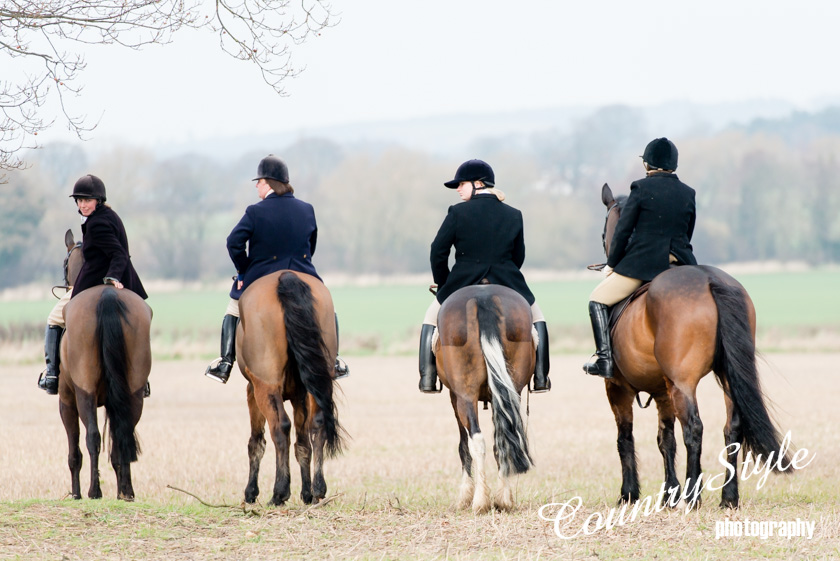 Buff breeches and black boots. A black or navy blue hunting cap or riding hat and hair should be neatly tied back with a hair net and ear rings removed.
Buff breeches and black boots. A black or navy blue hunting cap or riding hat and hair should be neatly tied back with a hair net and ear rings removed.
Children
Ideally children should wear a tweed jacket, a pony club tie, beige jodphurs and brown boots/chaps. However, keeping warm and dry is important, and a waterproof coat is perfectly acceptable on wet days.
Overall, the hunting field is not the place for flashy, sparkly equestrian wear whether it be on the horse or rider, a more traditional and under-stated turn-out is the preference.
(Scarlet is never worn by a lady, however a female Master will wear brass buttons instead of hunt buttons. Gentleman Masters, Field Masters and hunt staff wear scarlet coats and have an assortment of other subtle differences)
How should my horse be turned out?
Your horse should be clean and tidy and turned out to a high standard. Whilst plaiting looks very smart it is not compulsory although respectful at a lawn meet. Boots can be worn but be aware that it can be a long muddy day and the risk of sores often outweigh any benefits. Tack should be plain and functional and kept in good repair. A neck strap is advised if a martingale is not being used. If your horse is young or you are not sure of its temperament a green ribbon should be worn, and if you know your horse is liable to kick you must wear a red ribbon, in both cases they should always be kept at the back of the Field and turned to face hounds if you find yourself near them. A ribbon does not exonerate you from taking responsibility for the actions of you and your horse.
What should I have in my pockets?
The money for your cap, a penknife, some baler twine and possibly some food. It can also be useful to carry a handkerchief and a mobile phone in case of emergency. If you suffer from any medical condition it might be wise to carry a printed copy of your details so we can help you incase of an accident.
Arriving at the meet
It is always advisable to arrive in good time, not only does it spare you any panic but you are more likely to find a convenient place to park and un-box. Please be thoughtful when you park and avoid gateways, mown verges, and obstructing any other boxes or vehicles. Always make sure there is plenty of room for farm machinery to pass, especially on narrow lanes and only ever park in a farm yard or around farm buildings with the express permission from the farmer or a Master beforehand.
What should I do at the meet?
On arriving at the meet your first duty is to find the Hunt Secretary and offer her your cap, she should not be expected to find you. Similarly you should say Good morning to the Joint Masters. The correct greeting being “Good morning Master” (even if you know them personally). It is also important not to barge through the other horses or get amongst the hounds, sometimes it is safer to keep to the edge of the crowd with the horses back hooves firmly away from others until you know your horse is settled. It is important to find out who is the Field Master for the day and keep behind him/her and obey their instructions. If hospitality has been offered at the meet, try and thank the hosts before moving off.
What do I need to know about hounds?
Kicking a hound is considered the cardinal sin out hunting, so every precaution must be taken to avoid it happening. Always face your horse towards hounds to minimise the risk and be aware that having a pack of hounds round a horses back legs is very different to the familiar yard pooch. Generally it is wise not to get amongst the hounds unless the huntsman has specifically asked you to be there. A call of “Hounds Please!” is a warning to indicate that you need to make way for the hounds as they pass. Always give way to hounds, whether in a gateway or in front of a jump. It is also considered bad form to chatter noisily when hounds are working and trying to pick up a scent, it is not only distracting but can be very frustrating for the huntsman who is trying to hear the hounds speak. Lastly, never use your whip or shout at the hounds, this is a job for the Huntsman and his staff.
What is “The Field”
Everyone mounted on a days hunting, excluding the huntsman and his staff are referred to as the Field. The Field Master is in charge of the Field and everyone else should remain behind him/her and obey their instructions. The Huntsman, his staff and the hounds should always be given priority by all members of the Field.
Roads
Inevitably you will find yourself on the road at some stage, always remember to smile and thank any other road users. For many people, this is the only glimpse they will have of hunting and it is imperative that they are left with a good impression. Always be aware of cars that are wanting to get past and make way for them as quickly and carefully as you can. A proper thank you is appreciated far more than a casual wave of a hand.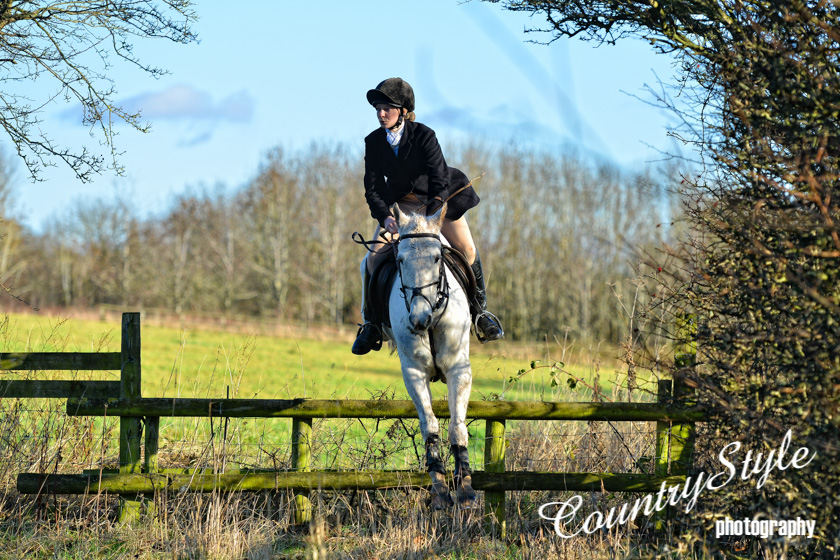
Jumping Etiquette
At all times ride behind the Field Master, and do not attempt to jump if there is a hound anywhere near the jump. If you know that your horse is an unreliable jumper let others go first and if your horse refuses, move quickly out of the way so that others can go before you try again. If you are jumping out of a sown field please keep as close to the edges and make as little mess as possible, and if your horse refuses it is better to find an alternative route than damage the crop by attempting the obstacle repeatedly. If you break a jump make sure it is stock proof before you go on, (you may be thankful for that baler twine) and ensure you report the damage to the Field Master. If you attempt to jump a gate and break it you will be expected to pay for it.
If someone in the field has a fall or their horse is injured, please stop to help. If necessary call for additional support and back-up. Otherwise, help catch any loose horses and wait until the faller is safely remounted before moving on. If you see that a problem is adequately taken care of, please pass slowly and then continue on, this allows the rest of the field to keep up with the Field Master.
What if I don’t want to jump?
There are nearly always ways round a jump and a number of people do not jump at all so there is usually someone to follow, however try to keep together as without the Field Master you will not always know if every field is suitable to be ridden over, and until you know the country it is the quickest way to get lost. If you know you are not jumping it is best to ask the Field Master at the beginning of the day so they can introduce you to a non jumping member or hunt official before you set off. Never open a gate adjacent to a jump until all jumpers have gone, this can be very dangerous as it invites the horse to dip out at the last minute.
Gates
If in doubt it is always better to shut a gate than leave it open. It is your responsibility to shut a gate or call back “gate please” being sure it has passed on behind you. In the event that riders behind are out of earshot, a raised hand or whip is the method of communication but do not move on until you are sure the following riders have acknowledged you with a returned raised hand. It is the duty of all members of the Field to assist the Masters and hunt staff at gates. If you see them approaching a gate, a word to the field master for consent to go forward is all that is required and then speedy assistance so as not to hold them up. It is not necessary to say that the younger members should always be the first to offer!
Riding through livestock and farmland
If riding through livestock ensure you go at a pace that does not upset them, and ride between them and the fence giving them as much space as you can. If they bunch up in a corner, stop and wait for them to move out. Take particular care at gates and if you witness any escaping report to the Field Master or Secretary immediately. You should not enter any field without the Field Master unless instructed to do so.  The current system of subsidies and farm practices is complicated so always be aware of any instructions, single file means exactly that, and following the same path as the Field Master, this is not always obvious as under some stewardship schemes you are not permitted to ride on grass headlands and instead must ride between the headland and the cropped area. If you get left behind look for the hoof prints.
The current system of subsidies and farm practices is complicated so always be aware of any instructions, single file means exactly that, and following the same path as the Field Master, this is not always obvious as under some stewardship schemes you are not permitted to ride on grass headlands and instead must ride between the headland and the cropped area. If you get left behind look for the hoof prints.
What happens if I get left behind/lost?
We all try to look out for each other especially any newcomers, but if you find yourself without the Field Master always use the least disruptive route possible to get back to a road or bridleway. Choose a track or path instead of a field and use your common sense. If you should meet the farmer apologise and courteously ask the best route so as not to cause any harm.
At all times remember that you are a guest of the farmer or landowner and that without their goodwill hunting would not be possible.
When do I leave?
You can leave at any point during the day although it is best to wait until you are on a road or bridleway and know a safe route back. Alternatively the Field Master will be able to give you directions. In either case and whatever the time, you must always say “Goodnight” to the Field Master, but if for any reason this is not possible ask another member of the Field to pass the message on. A huge amount of time and preparation is put in to each days hunting and a thank you to Masters and staff goes a long way.
Did you fall off or get shouted at?
Probably, but its happened to us all more often than we like to admit!
If all this sounds complicated and daunting don’t worry, the members of the hunt are always willing to help you and never be scared to ask for advice. We want you to enjoy your day so much that you want to come back again and again…
Foot and Car Followers
Many people choose to follow the hunt by foot or car but it is of great importance that they are considerate to other road users, private property and the hounds. Blocking roads and lanes not only creates a very poor impression of hunting to the wider public but it can also impede and potentially be dangerous for the hounds and mounted followers. 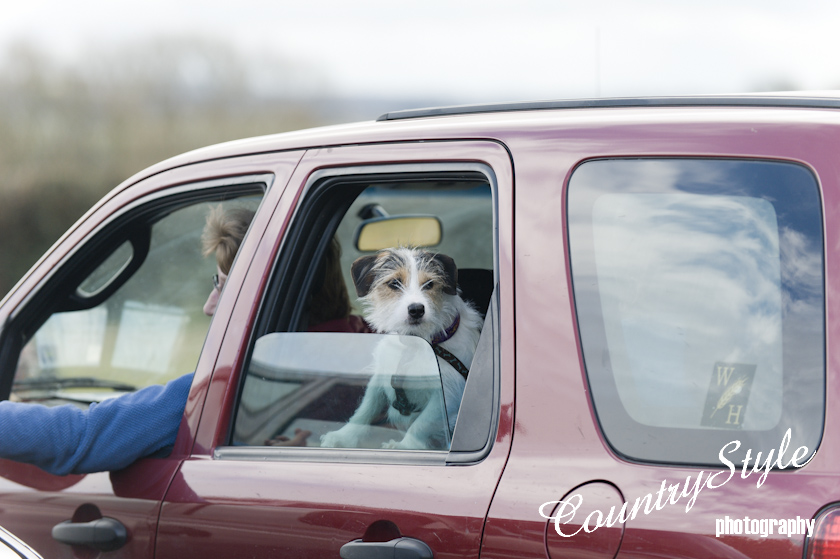 Whilst hounds and horses might be welcome on private land and gateways, farmers might not be thrilled to have tyre marks reminding them of your presence for the rest of the winter! If you find yourself near the ‘line’ or hounds are speaking close by, you should turn off your engine as the fumes can easily muddle or obscure the scent. If you see the quarry you should stay still, turn off your engine and then pass on information if you think it is useful to the huntsman at that time, ie: If hounds are speaking strongly on the line it is better to leave them to it. Common sense and courtesy should prevail at all times.
Whilst hounds and horses might be welcome on private land and gateways, farmers might not be thrilled to have tyre marks reminding them of your presence for the rest of the winter! If you find yourself near the ‘line’ or hounds are speaking close by, you should turn off your engine as the fumes can easily muddle or obscure the scent. If you see the quarry you should stay still, turn off your engine and then pass on information if you think it is useful to the huntsman at that time, ie: If hounds are speaking strongly on the line it is better to leave them to it. Common sense and courtesy should prevail at all times.
The South Shropshire Hunt acts in a way consistent with the laws as set out in the Hunting Act 2004
For newcomers, The Countryside Alliance has a leaflet- “A newcomers’ guide to the how, where, when & what of hunting” which is free to download here.













